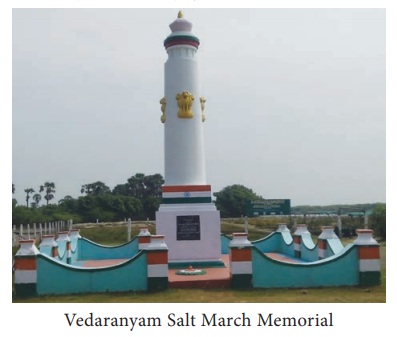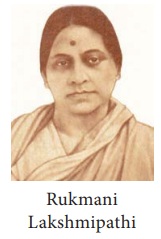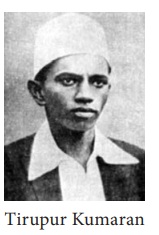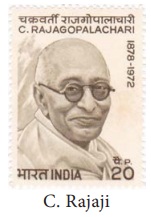Freedom Struggle in Tamil Nadu - Civil Disobedience Movement | 10th Social Science : History : Chapter 9 : Freedom Struggle in Tamil Nadu
Chapter: 10th Social Science : History : Chapter 9 : Freedom Struggle in Tamil Nadu
Civil Disobedience Movement
Civil Disobedience Movement
(a) Towards Poorna Swaraj
The
Madras session of the Indian National Congress in 1927 declared complete
independence as its goal. In the 1929 Lahore session of the Congress, Poorna
Swaraj (complete independence) was adopted as the goal and on 26 January 1930
the national flag was hoisted by Jawaharlal Nehru on the banks of river Ravi as
the declaration of independence.
(b) Salt March to Vedaranyam
When the
Viceroy did not accept the demands put forward by Gandhi, he launched the Civil
Disobedience Movement. Rajaji organised and led a salt satyagraha march to
Vedaranyam. The march started from Tiruchirappalli on 13 April 1930 and reached
Vedaranyam in Thanjavur district on 28 April. A special song was composed for
the march by Namakkal V. Ramalinganar with the lines, “A War is ahead sans sword, sans bloodshed… Join this march.” Despite a brutal crackdown by the
police, the marching satyagrahis were
provided a warm reception along the route. On reaching Vedaranyam 12 volunteers
under the leadership of Rajaji broke the salt law by picking up salt. Rajaji
was arrested. T.S.S. Rajan, Rukmani Lakshmipathi, Sardar Vedarathnam, C.
Swaminathar and K. Santhanam were among the prominent leaders who participated
in the Vedaranyam Salt Satyagraha.

(c) Widespread Agitations in Tamil Districts
The satyagrahis under the leadership of T.
Prakasam and K. Nageswara Rao set up a camp at Udayavanam near Madras. However,
the police arrested them. It led to a hartal in Madras.

The clashes
with the police in Tiruvallikeni which lasted for three hours on 27 April 1930
left three dead. Volunteers who attempted to offer salt Satyagraha in Rameswaram
were arrested. Mill workers struck work across the province. Woman participated
enthusiastically. Rukmani Lakshmipathi was the first woman to pay penalty for
violation of salt laws. Police used brutal force to suppress the movement.
Bhashyam, popularly known as Arya, hoisted the national flag atop Fort St.
George on 26 January 1932.
Martyrdom of Tirupur Kumaran
On 11
January 1932 a procession carrying national flags and singing patriotic songs was
brutally beaten by the police in Tirupur. O.K.S.R. Kumaraswamy, popularly Tirupur
Kumaran, fell dead holding the national flag aloft. He is hailed as Kodkatha
Kumaran.

(d) First Congress Ministry
In the
1937 election the Congress emerged victorious. The Justice Party was trounced.
Congress victory in the elections clearly indicated its popularity with the
people.

Rajaji
formed the first Congress Ministry. He introduced prohibition on an
experimental basis in Salem. To compensate for the loss of revenue he
introduced a sales tax. When the British involved India in the Second World War
without consulting the elected Congress ministries, the latter resigned.
(e) Anti-Hindi Agitation
One of
the controversial measures of Rajaji was the introduction of Hindi as a
compulsory subject in schools. This was considered to be a form of Aryan and
North Indian imposition detrimental to Tamil language and culture, and
therefore caused much public resentment. E.V.R. led a massive campaign against
it. He organised an anti-Hindi Conference at Salem. It formulated a definite
programme of action. The Scheduled Castes Federation and the Muslim League
extended its support to the anti- Hindi agitation. Natarajan and Thalamuthu,
two of the enthusiastic agitators died in prison. A rally was organised from
Tiruchirappalli to Madras. More than 1200 protestors including E.V.R. were
arrested. After the resignation of the Congress Ministry, the Governor of
Madras who took over the reigns of administration removed Hindi as compulsory
subject.
Related Topics